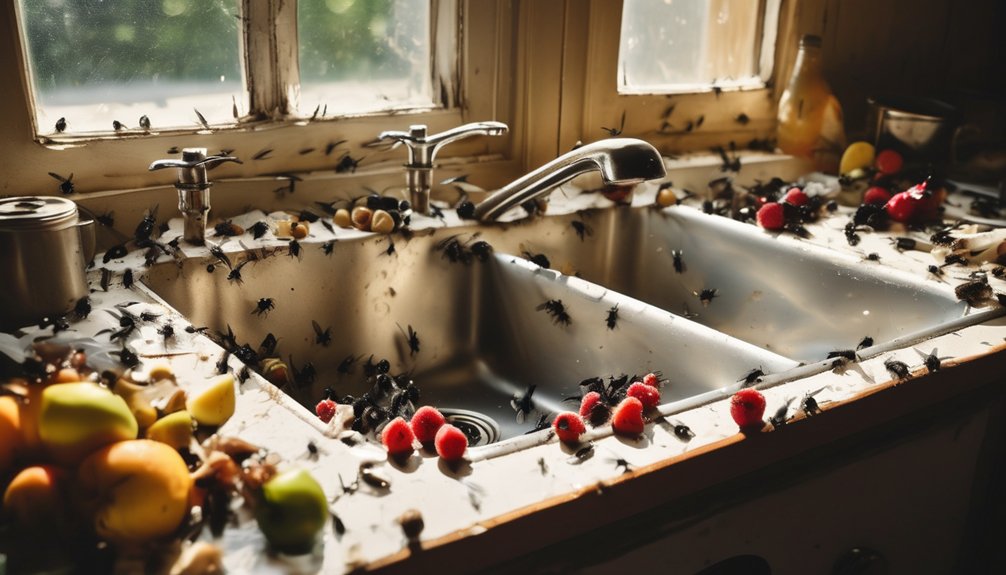You have many flies in your house because food sources, moisture, and shelter attract them indoors. Leaving uncovered fruits, garbage, or pet waste provides easy access to nutrition. Leaky pipes and standing water create breeding spots, while warmth offers comfort. To stop them, keep your space clean, seal containers, fix leaks, and install window screens. Identifying the fly type can help target control methods more effectively. Explore further to understand prevention and removal strategies suited for your situation.
Common Reasons Flies Invade Your Home
Although flies may seem like minor nuisances, they often enter your home for specific reasons related to their survival needs.
You attract flies primarily through accessible food sources, such as uncovered fruits, garbage, or pet waste. Moisture also draws them in, especially from leaky pipes or standing water.
Additionally, flies seek shelter in your house to escape harsh weather conditions, finding warmth and protection indoors. Understanding these factors helps you recognize why flies invade your space.
Identifying the Types of Flies in Your House
Recognizing why flies enter your home is only part of managing their presence effectively. You need to identify the types of flies you’re dealing with, as different species behave differently.
House flies are common, gray with four dark stripes on their thorax. Fruit flies are smaller, attracted to ripened fruits and sugary liquids. Drain flies have fuzzy bodies and appear near sinks or drains. Cluster flies are larger and slow-moving, often found resting on walls.
Knowing these distinctions helps you understand their habits and habitats, enabling you to observe patterns without unnecessary assumptions or confusion.
Effective Methods to Prevent Fly Infestations
When you want to prevent fly infestations effectively, it’s important to focus on eliminating the factors that attract them in the first place.
Keep your living space clean by promptly disposing of garbage and sealing containers tightly. Remove standing water and fix leaks to reduce breeding sites.
Screen doors and windows to block entry points, and guarantee vents and gaps are sealed. Regularly clean pet areas and avoid leaving food out.
Natural and Chemical Solutions to Get Rid of Flies
Several natural and chemical solutions exist to help you get rid of flies effectively. You can choose methods that suit your lifestyle and preference for freedom from pests.
Consider these options:
- Essential oils and herbs: Use citronella, eucalyptus, or basil near windows and doorways to naturally repel flies.
- Fly traps and swatters: Employ sticky traps or manual swatters to reduce fly numbers efficiently and without chemicals.
- Insecticides: Apply fly sprays or baits cautiously, following instructions to minimize risks and target flies directly.
Each method offers a practical way to regain control over your indoor environment.
Frequently Asked Questions
Can Flies Transmit Diseases to Humans or Pets?
Yes, flies can transmit diseases to you and your pets by carrying bacteria and viruses from garbage or waste. You’ll want to keep your space clean and use screens or traps to keep them out and protect your freedom.
Why Do Flies Seem More Active at Certain Times of Day?
Flies seem more active during warm, sunny hours because their muscles need heat to move efficiently. You’ll notice them buzzing around mid-morning to late afternoon when temperatures peak and food sources are easiest to find.
Do Certain Houseplants Repel Flies Naturally?
Yes, you can naturally repel flies with houseplants like basil, lavender, and mint. They release scents flies dislike, helping you keep your space fresh and fly-free without relying on chemicals or traps.
How Long Do Common House Flies Live?
Common house flies live about 15 to 30 days, but their lifespan shortens if conditions aren’t ideal. You can control their presence by staying proactive and keeping your space clean and fly-free.
Are Ultrasonic Devices Effective Against Flies?
Ultrasonic devices aren’t very effective against flies; they mostly ignore those high-frequency sounds. You’ll have better luck using physical traps, keeping your space clean, and sealing entry points to truly regain control and freedom from flies.

Leave a Reply